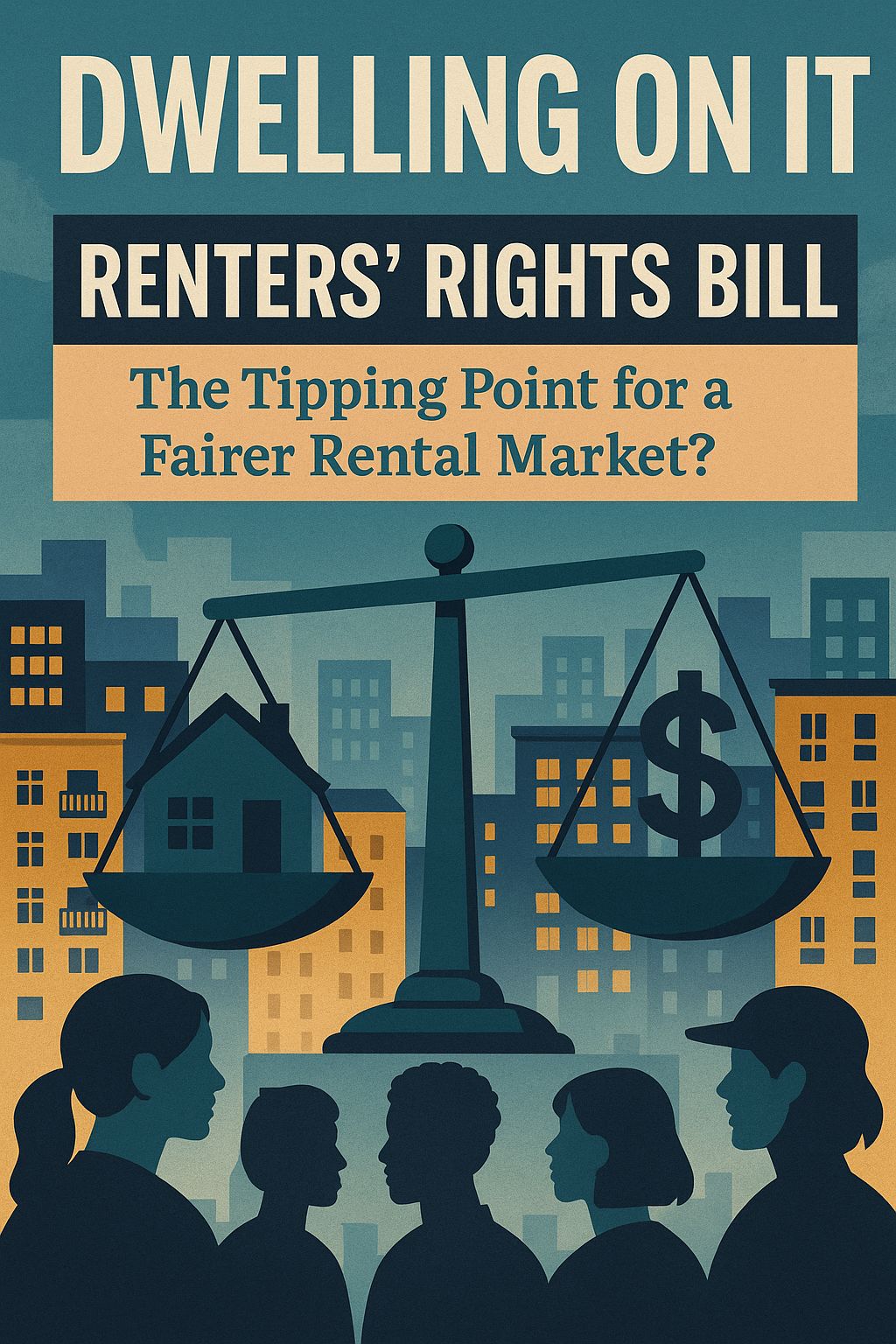- Dwelling On It
- Posts
- Renters’ Rights Bill: The Tipping Point for a Fairer Rental Market?
Renters’ Rights Bill: The Tipping Point for a Fairer Rental Market?
How long-awaited reforms could finally shift the balance of power toward tenants.

Introduction
The Renters’ Rights Bill is set to reshape England’s private rental sector, aiming to deliver unprecedented security, affordability, and accountability for the nation’s 11 million renters. Below, you’ll find a detailed breakdown of the Bill’s provisions, practical implications, and the concerns raised by both tenants and landlords.
1. Abolishing “No-Fault” Evictions (Section 21)
Key Changes:
Section 21 Abolished: Landlords can no longer evict tenants without providing a valid reason. All evictions must proceed under Section 8, which requires landlords to prove legal grounds for possession, such as rent arrears, anti-social behaviour, or breach of tenancy.
Expanded Grounds for Possession: New and revised grounds include landlords wishing to sell or move into the property. However, landlords cannot use these grounds within the first 12 months of a tenancy, and must provide four months’ notice. If evicting to sell or move in, landlords are barred from re-letting the property for 12 months, with penalties for breaches.
Rent Arrears Threshold: The threshold for mandatory eviction due to rent arrears rises from two to three months (or 13 weeks for weekly rents), and the notice period increases from two to four weeks.
Court Process: All evictions now require court involvement, potentially leading to longer possession timelines and increased pressure on the legal system.
Implications:
For Renters: Stronger security, reduced risk of retaliatory or arbitrary evictions, and more time to resolve arrears or find alternative housing.
For Landlords: Reduced flexibility, longer timelines for regaining possession, and stricter penalties for procedural breaches. Some landlords are considering exiting the market due to perceived burdens and uncertainty.
2. Restricting Rent Hikes & Ending Bidding Wars
Rent Increase Regulation:
Annual Limit: Landlords can only raise rent once per year, and increases must reflect local market values. Automatic rent review clauses are banned.
Notice Period: The minimum notice for rent increases doubles from one to two months.
Tenant Challenge: Tenants can challenge excessive rent hikes at an independent tribunal. “Backdoor evictions” via unaffordable rent increases are explicitly prohibited.
Bidding Wars Banned: Landlords must advertise a fixed rent and cannot accept offers above the listed price, ending competitive bidding among tenants.
Implications:
For Renters: Greater predictability, protection from exploitative rent hikes, and the ability to contest unfair increases.
For Landlords: Some may pre-emptively raise starting rents or become more selective with tenants to offset new constraints.
3. Capping Upfront Costs & Tackling Discrimination
Upfront Rent and Deposits:
Advance Rent Cap: Advance rent payments are generally limited to one month, although tenants and landlords can still mutually agree to up to 12 months in advance.
Deposit Cap: Security deposits remain capped at five weeks’ rent for annual rents under £50,000 (six weeks for higher rents).
Anti-Discrimination Measures:
No Blanket Bans: Landlords cannot refuse tenants based on benefit status, having children, or pet ownership. While pet insurance may be requested, blanket bans on pets are not allowed.
Transparency: Landlords must provide a written ‘statement of terms’ before tenancy begins, outlining all rights and obligations.
Implications:
For Renters: Lower financial barriers to securing a home and greater protection from discrimination.
For Landlords: Reduced ability to mitigate perceived risks, especially with student or non-salaried tenants, prompting increased use of guarantors or rental insurance.
4. Raising Standards & Enforcing Accountability
Awaab’s Law and Decent Homes Standard:
Hazard Response: Landlords must address emergency hazards (e.g., damp, mould) within 24 hours, and other hazards within fixed timeframes (staged rollout from 2025 to 2027).
Decent Homes Standard: For the first time, private rentals must meet the same safety and quality standards as social housing. Currently, 21% of private homes are considered “non-decent”.
Penalties: Fines of up to £7,000 for non-compliance, with local authorities empowered to impose penalties and require alternative accommodation for tenants while repairs are made.
New Infrastructure:
Landlord Register: All landlords must register on a national database, which supports enforcement and transparency. Only registered landlords can use certain possession grounds.
Private Rented Sector Ombudsman: Provides binding, impartial resolution for tenant complaints, bringing the sector in line with social housing and property agent standards.
5. Broader Impacts & Industry Response
For Tenants:
Immediate security from day one, the ability to challenge poor practice, and a clear route to redress.
Empowerment to report issues without fear of eviction.
For Landlords:
Increased regulatory burden and reduced flexibility, prompting some to consider selling or exiting the sector.
Need to adapt to new compliance requirements, documentation, and standards of property management.
Market Dynamics:
Some landlords have already evicted tenants ahead of the Bill’s passage, fearing future difficulties regaining possession.
The Bill’s success depends on effective enforcement and adequate local authority resources.
Table: Key Provisions at a Glance
Provision | Details | Impact on Renters | Impact on Landlords |
|---|---|---|---|
Section 21 Abolished | No-fault evictions banned; Section 8 only with valid grounds | More security, less arbitrary eviction | Longer possession process, less flexibility |
Rent Increase Regulation | Limit to 1/year, 2 months’ notice, tribunal challenge possible | Predictable, fairer rents | No automatic increases, more scrutiny |
Upfront Cost Cap | Advance rent capped (usually 1 month), deposit cap remains | Lower entry costs | Less risk mitigation, more scrutiny |
Anti-Discrimination | No blanket bans on benefits, children, or pets | Wider access to homes | Must justify refusals, new insurance options |
Awaab’s Law & Decent Homes | Strict hazard response times, fines for non-compliance | Safer, healthier homes | Fines, legal obligations, higher standards |
Landlord Register & Ombudsman | National database, binding complaint resolution | Easier redress, more transparency | New compliance, risk of penalties |
Conclusion
The Renters’ Rights Bill represents a sweeping transformation of England’s private rental market. While it brings overdue protections and higher standards for tenants, it also introduces new complexities and responsibilities for landlords. The true test will be in the Bill’s enforcement and the sector’s ability to adapt to a more regulated, transparent, and equitable landscape.


